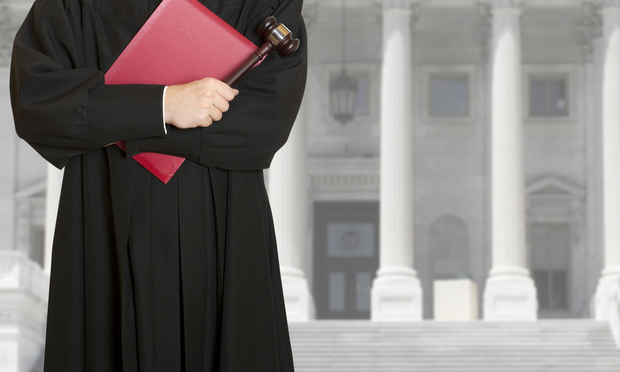Third Circuit Begins Search for Temp Judges on Del. Bankruptcy Court
The U.S. Court of Appeals for the Third Circuit has begun its search for two temporary bankruptcy judges in Delaware, nearly 10 months after Congress passed legislation to provide reinforcement for one of the busiest bankruptcy courts in the nation.
September 11, 2018 at 03:17 PM
5 minute read
The original version of this story was published on Delaware Law Weekly

The U.S. Court of Appeals for the Third Circuit has begun its search for two temporary bankruptcy judges in Delaware, about 10 months after Congress passed legislation to provide reinforcement for one of the busiest bankruptcy courts in the nation.
In a public notice dated Sept. 5, Chief Judge D. Brooks Smith of the U.S. Court of Appeals for the Third Circuit said the court would be accepting electronic applications for the two positions through Oct. 5, a timeline that Potter Anderson & Corroon partner Jeremy W. Ryan said could produce new judges by the end of the year.
Congress authorized the new posts and extended the district's five other temporary judgeships late last October as part of a major disaster-relief bill to aid in the recovery from a series of hurricanes and wildfires. President Donald Trump signed the legislation into law Oct. 26.
Ryan, the vice chair of the Delaware State Bar Association's bankruptcy law section, attributed the delay to “logistical” issues associated with creating additional space to support the new positions.
According to the notice, the process for selecting the temporary judges will be “confidential and competitive,” and the positions will be identical to permanent judgeships, “from the standpoint of the applicant.” The current salary for the post is $191,360, the announcement said.
Unlike district court judgeships, applications for vacancies on the bankruptcy court are not limited to Delaware-barred attorneys, and the Third Circuit would review candidates “in good standing of the bar of the highest court of at least one state, the District of Columbia, or the Commonwealth of Puerto Rico and a member in good standing of every other bar of which they are members.”
Applicants are required to have at least five years' experience practicing law, according to the job posting; they may not be related to any judges on the Third Circuit or be a member of the Judicial Council of the Third Circuit.
The positions are not subject to confirmation by the U.S. Senate. Rather, Ryan said, the court would form a panel to review applications and recommend candidates for interviews with the Third Circuit, and it would ultimately be up to the court to decide the final selections.
“If previous timelines hold with applications being done, the Third Circuit will have a decision some eight to 10 weeks after,” the Oct. 5 deadline, Ryan said.
Ryan added that interest in the local bar was high, but he had not heard any names of potential candidates.
The U.S. Bankruptcy Court for the District of Delaware, which features just one permanent judge in Wilmington, has been operating with the assistance of five temporary judges since 2005, when Congress created 27 temporary judgeships amid a national rise in bankruptcy filings.
The positions were renewed for five more years in 2012, but expired in May, setting up what the Judicial Conference of the United States warned could be a “debilitating workload crisis” if they were not made permanent.
Last year's legislation, introduced by U.S. Sen. Chris Coons, initially called for converting 14 temporary judgeships—including the five in Delaware—into permanent positions. The measure cleared the Senate by unanimous consent, but was never taken up in the U.S. House of Representatives, according to congressional records.
Instead, a revised version emerged in a compromise that was later tacked on to a House bill authorizing federal funds to assist the victims a string of natural disasters.
Under the new bill, which passed in October, the temporary judgeships were extended and new short-term positions were added for Delaware, Michigan and the Middle District of Florida. However, no new permanent judgeships were added.
Delaware, like most jurisdictions across the country, has seen an overall decline in bankruptcy filings since the financial crisis caused filings to peak in 2009. In 2016, new filings in Delaware fell to 2,951, down 36 percent from a high of 4,630 seven years prior, according to statistics from the Judicial Conference.
However, Delaware's docket still has a high number of Chapter 11 cases, which tend to be more complex than other bankruptcy filings, and “mega” cases—filings involving at least $100 million or 1,000 creditors or more—have also been on the rise, causing some to express concern for the long-term stability of the court.
Ryan said the new temporary positions would help ease the strain on the court, but he said there remains a desire in Delaware to see more permanent judges on the court.
“This is what we have right now,” he said. “It would always be nice to have them all be permanent, but I'm not aware of any other [proposals] in Congress.”
This content has been archived. It is available through our partners, LexisNexis® and Bloomberg Law.
To view this content, please continue to their sites.
Not a Lexis Subscriber?
Subscribe Now
Not a Bloomberg Law Subscriber?
Subscribe Now
NOT FOR REPRINT
© 2025 ALM Global, LLC, All Rights Reserved. Request academic re-use from www.copyright.com. All other uses, submit a request to [email protected]. For more information visit Asset & Logo Licensing.
You Might Like
View All
Zoom Faces Intellectual Property Suit Over AI-Based Augmented Video Conferencing
3 minute read
Etsy App Infringes on Storage, Retrieval Patents, New Suit Claims


Law Firm Sued for $35 Million Over Alleged Role in Acquisition Deal Collapse
3 minute readTrending Stories
- 1Uber Files RICO Suit Against Plaintiff-Side Firms Alleging Fraudulent Injury Claims
- 2The Law Firm Disrupted: Scrutinizing the Elephant More Than the Mouse
- 3Inherent Diminished Value Damages Unavailable to 3rd-Party Claimants, Court Says
- 4Pa. Defense Firm Sued by Client Over Ex-Eagles Player's $43.5M Med Mal Win
- 5Losses Mount at Morris Manning, but Departing Ex-Chair Stays Bullish About His Old Firm's Future
Who Got The Work
J. Brugh Lower of Gibbons has entered an appearance for industrial equipment supplier Devco Corporation in a pending trademark infringement lawsuit. The suit, accusing the defendant of selling knock-off Graco products, was filed Dec. 18 in New Jersey District Court by Rivkin Radler on behalf of Graco Inc. and Graco Minnesota. The case, assigned to U.S. District Judge Zahid N. Quraishi, is 3:24-cv-11294, Graco Inc. et al v. Devco Corporation.
Who Got The Work
Rebecca Maller-Stein and Kent A. Yalowitz of Arnold & Porter Kaye Scholer have entered their appearances for Hanaco Venture Capital and its executives, Lior Prosor and David Frankel, in a pending securities lawsuit. The action, filed on Dec. 24 in New York Southern District Court by Zell, Aron & Co. on behalf of Goldeneye Advisors, accuses the defendants of negligently and fraudulently managing the plaintiff's $1 million investment. The case, assigned to U.S. District Judge Vernon S. Broderick, is 1:24-cv-09918, Goldeneye Advisors, LLC v. Hanaco Venture Capital, Ltd. et al.
Who Got The Work
Attorneys from A&O Shearman has stepped in as defense counsel for Toronto-Dominion Bank and other defendants in a pending securities class action. The suit, filed Dec. 11 in New York Southern District Court by Bleichmar Fonti & Auld, accuses the defendants of concealing the bank's 'pervasive' deficiencies in regards to its compliance with the Bank Secrecy Act and the quality of its anti-money laundering controls. The case, assigned to U.S. District Judge Arun Subramanian, is 1:24-cv-09445, Gonzalez v. The Toronto-Dominion Bank et al.
Who Got The Work
Crown Castle International, a Pennsylvania company providing shared communications infrastructure, has turned to Luke D. Wolf of Gordon Rees Scully Mansukhani to fend off a pending breach-of-contract lawsuit. The court action, filed Nov. 25 in Michigan Eastern District Court by Hooper Hathaway PC on behalf of The Town Residences LLC, accuses Crown Castle of failing to transfer approximately $30,000 in utility payments from T-Mobile in breach of a roof-top lease and assignment agreement. The case, assigned to U.S. District Judge Susan K. Declercq, is 2:24-cv-13131, The Town Residences LLC v. T-Mobile US, Inc. et al.
Who Got The Work
Wilfred P. Coronato and Daniel M. Schwartz of McCarter & English have stepped in as defense counsel to Electrolux Home Products Inc. in a pending product liability lawsuit. The court action, filed Nov. 26 in New York Eastern District Court by Poulos Lopiccolo PC and Nagel Rice LLP on behalf of David Stern, alleges that the defendant's refrigerators’ drawers and shelving repeatedly break and fall apart within months after purchase. The case, assigned to U.S. District Judge Joan M. Azrack, is 2:24-cv-08204, Stern v. Electrolux Home Products, Inc.
Featured Firms
Law Offices of Gary Martin Hays & Associates, P.C.
(470) 294-1674
Law Offices of Mark E. Salomone
(857) 444-6468
Smith & Hassler
(713) 739-1250






